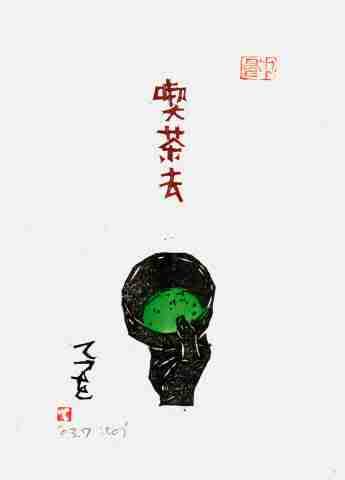clayart - thread 'was:non functional? now: origins of raku - lee?':
"The monk that traveled to China with Dogen brought back the first glaze
technologies from Sung China, but not the noborigama:
The legendary Toshiro, also known as Kato Shirozaemon Kagemasa (1169 -
1249), went to China with the Zen monk Dogen around 1223. Upon his return
in 1228, he established the first Seto kiln and began to make glazed wares
in a Chinese style, imitating Chinese celadon."

Monday, April 9, 2007
Tea Mind, Be Kind
Tea Mind, Be Kind
"At night I went out into the dark &
saw a glimmering star & heard a
frog & Nature seemed to say, Well
do not these suffice?"
Ralph Waldo Emerson
"At night I went out into the dark &
saw a glimmering star & heard a
frog & Nature seemed to say, Well
do not these suffice?"
Ralph Waldo Emerson
Psychological Aspects of the Way of Tea
Psychological Aspects of the Way of Tea: "Japan Studies Association Journal, Vol. 2, pp.29-36.
Psychological Aspects of the Way of Tea
Sheila Fling
Southwest Texas State University
The Japanese 'way of tea' (chado) has historical roots from the twelfth century and has been practiced by millions in essentially the same form since the sixteenth century, yet its many psychological aspects have received scant analysis. A 400-year-old practice, to which there seems nothing truly similar in all the world, yet which has now captivated followers in at least 23 other countries, seems worthy of examination from a psychological perspective.
This article provides a cursory overview of possible motivations for entering the way of tea, its four major psychospiritual principles, several of its aesthetic values, the training process, the experience itself, and its alleged benefits. Because of the very syncretic and holistic nature of the way of tea, the use of the perspectives of transpersonal psychology and health psychology seem most appropriate although behavioral, cognitive, and humanistic-existential psychology will also be applied.
What is it that brings one to study on ones knees for hours at a time for a lifetime, learning more than 200 different detailed procedures for preparing and"
Psychological Aspects of the Way of Tea: "Japan Studies Association Journal, Vol. 2, pp.29-36.
Psychological Aspects of the Way of Tea
Sheila Fling
Southwest Texas State University
The Japanese 'way of tea' (chado) has historical roots from the twelfth century and has been practiced by millions in essentially the same form since the sixteenth century, yet its many psychological aspects have received scant analysis. A 400-year-old practice, to which there seems nothing truly similar in all the world, yet which has now captivated followers in at least 23 other countries, seems worthy of examination from a psychological perspective.
This article provides a cursory overview of possible motivations for entering the way of tea, its four major psychospiritual principles, several of its aesthetic values, the training process, the experience itself, and its alleged benefits. Because of the very syncretic and holistic nature of the way of tea, the use of the perspectives of transpersonal psychology and health psychology seem most appropriate although behavioral, cognitive, and humanistic-existential psychology will also be applied.
What is it that brings one to study on ones knees for hours at a time for a lifetime, learning more than 200 different detailed procedures for preparing and"
Psychological Aspects of the Way of Tea: "Japan Studies Association Journal, Vol. 2, pp.29-36.
Sunday, April 8, 2007
Friday, April 6, 2007
Sunday, April 1, 2007
Subscribe to:
Posts (Atom)












